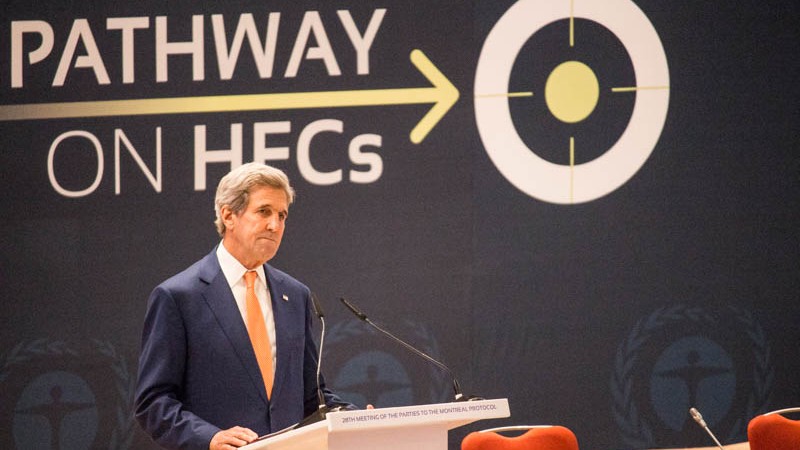“We all know that the window of time that we have to prevent the worst climate impacts from happening is in fact narrowing, and it is closing fast,” US Secretary of State John Kerry warned on Friday in Kigali.
As talks run into overtime on an amendment to the Montreal Protocol that will prevent up to 0.5C of global warming by phasing down emissions of HFC gases, the same sense of urgency pervades the assembly.
But a clear phase-down schedule for the chemical coolants used in air conditioners is still uncertain. Officials already declare victory but won’t disclose the state of the talks and voices in the corridors sound less upbeat. So far, the only unanimous action delegates and observers have taken is to book their return flights on Saturday night, anticipating a long, difficult negotiation.
At the time of writing, a big group of developing countries, including China and the African group, was pushing for a peak in consumption in 2020 or 2022. But a smaller group which included India and the Gulf States remained firm on a later date, somewhere between 2024 and 2026.
Report: India domestic action smooths path to HFC deal in Kigali
There has been talk of a two-speed compromise, but Ghazi Odat, negotiator for Jordan with two decades of experience in the Montreal Protocol’s proceedings, told Climate Home that would bring problems with trade.
“For example, Jordan exports air conditioners and refrigerators domestically and internationally, sometimes to developed countries such as the USA, EU and Canada. This means we must adhere to the standards of our consumers,” he said. Failing to do so would prevent countries from developing internationally.
India is making the case for a slower phase-down in order to avoid patent charges from HFC alternatives developed in the US and EU, and to make its relatively recent investment in HCFCs worth the money.
But countries vulnerable to the impacts of climate change reminded delegates of the goals agreed in Paris: to hold global warming “well below 2C” and aim for 1.5C.
Weekly briefing: Sign up for your essential climate politics update
Speaking at the plenary, the Marshall Islands minister Mattlan Zackhras said: “This amendment will either provide us a credible pathway to limiting temperatures to 1.5 degrees by the end of the century, or it will not.
“Every year we delay our freeze date makes this less and less achievable. A five year delay on a freeze date may not seem like much, but it is the equivalent to running 700 coal fired power plants for the same period.”
Erik Solheim, head of the UN Environment Program (UNEP), urged countries to embrace business opportunities in climate-friendly alternatives. “Nations that change fast in the end will benefit the most in terms of jobs and industrial prospects,” he said. Those who delay change will miss out, but those who are at the forefront of change will be able to take advantage of lower prices to create a market for their product.”
In the last frantic hours, US negotiators are trying to soothe concerns about the costs of substitutes, many of which are being developed under patent in the US and Europe.
“A number of patents for chemicals that are currently very expensive are going to expire around 2025,” said Jennifer Haverkamp, a top envoy from the US State Department.
“The amendment we envision also gives countries a lot of flexibility over which sector to regulate first. They can choose to regulate patented chemicals later, when prices are more affordable, or they can ask for financial support from the Multilateral Fund [the financial mechanism of the Montreal Protocol], which in certain cases covers licensing costs.”
Lou Del Bello’s reporting from Kigali is funded by CDKN
